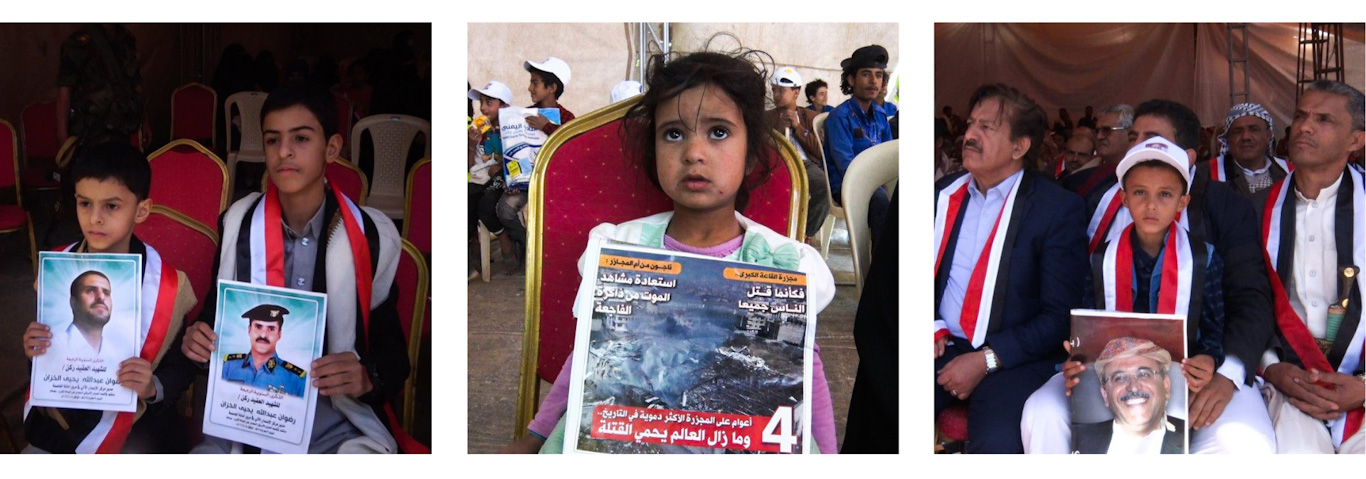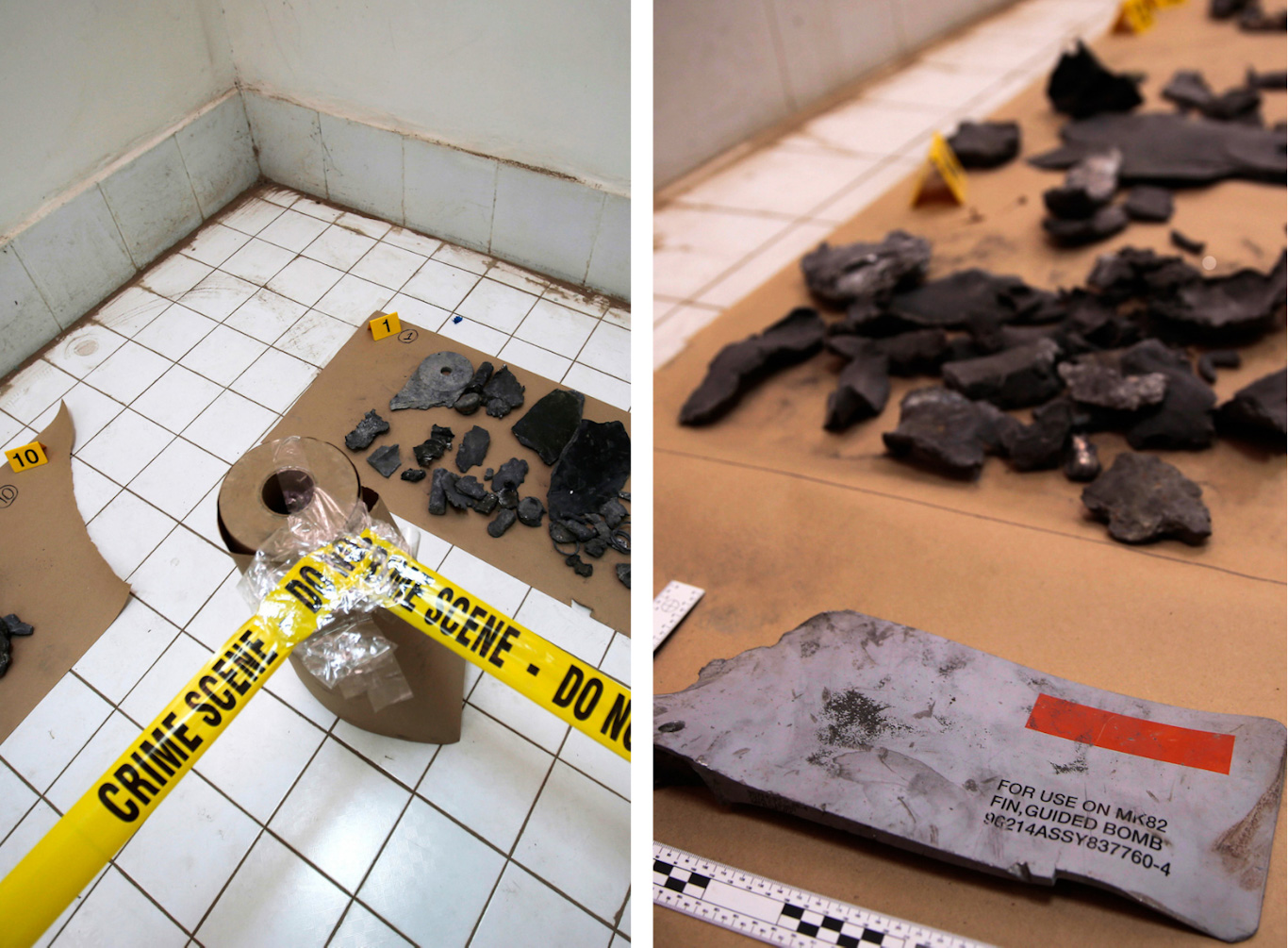Ten-year-old Ahmed Radwan al-Khazan holds his father’s photo in one hand and a wilted rose in the other. He sits on a chair surrounded by rubble and ash in what is left of Mourning Square. Dozens of children, along with their young widowed mothers, are perched on dozens of rows of chairs under a very long tent, its shadow cast across the wreckage of the Al Kubra Grand Hall building. There, family members of 240 people killed gathered yesterday to mark the fourth anniversary of the attack that saw Saudi warplanes drop an MK82 guided bomb on a funeral hall. There were at least 1,000 mourners inside Al Kubra, located in Yemen’s capital city of Sanaa, when the bombs struck on October 8, 2016.
Many of the children that survived the horrific event are still too young to fully grasp the gravity of the moment. Some carried red roses or white flowers, while the others carried posters emblazoned with images of their lost relatives. “American bombs killed my father. We will never forget that” Ahmed said angrily, his eyes brimming with tears. His mother pulled him away protectingly, tugging at his hand and saying, “your dad has gone to heaven.”
Images of the charred and mutilated remains of funeral-goers are still fresh in the minds of survivors and witnesses who spoke to MintPress. Sami Abdullah, who is now wearing newly fitted prosthesis to replace his missing left leg lost in the attack, said “We arrived early, at noon, and shook hands with the family members of al-Ruwayshan, after a while, we heard the loud screaming sound of a jet and then a bombing with big pressure… shrapnel… fire… and intense black smoke. Everything turned upside down, then, I stood up and ran and realized I had lost my leg. When I was a few steps from the gate, a second bomb hit the tent.”

Mourners hold photos of loved ones during an event commemorating the attack on Al Kubra. Photo | Ahmed AbdulKareem
A UN panel of experts would later find that the timing of the attack “coincided with a time when the funeral was expected to receive the highest number of mourners.”
US arms sales fuel the carnage
The bombing of the funeral was the deadliest single attack in Yemen’s six-year war, but was not the first Saudi attack on a civilian target, nor was it the last. But what made it different was its sheer scale, the fact it occurred in broad daylight, and that the Saudi military used by a double-tap airstrike to assure maximum carnage. Like the Saudi attack on a school bus that took place in August of 201 that killed more than 40 children and also used a U.S.-made MK82 guided bomb, justice for the victims of the Al Kubra attack has not been served. The United States still supplies weapons to Saudi Arabia and all attempts to put limits on those sales have been ignored.

MK82 bomb fragments found in the rubble of Al Kubra are seen at a crime lab in Sanaa, Yemen, Oct. 8, 2016. Hani Mohammed | AP
Since 2015, UN investigators have repeatedly warned of the heavy civilian death toll from the Saudi-led Coalition’s bombing campaigns, which almost exclusively use U.S.-made munitions. Yet the U.S. has continued selling arms to the Kingdom resulting in numerous massacres and the deaths of tens of thousands of civilians like those lost in the Al Kubra Hall attack. The catastrophic impact that western weapons, particularly American weapons, have had on Yemen is clear not only in terms of loss of life but in the creation of refugees, mental turmoil, and the destruction of vital infrastructure, especially the country’s healthcare system.
The United States claims that it does not make targeting decisions for the Saudi Coalition. But it does support Coalition operations through training, arms sales, the refueling of Saudi combat aircraft, and the sharing of intelligence. Those arms sales include precision-guided missiles as well as precision guidance parts used on the same warplanes responsible for civilian casualties in the Saudi-UAE’s military campaign in Yemen.
According to mourners gathered to commemorate the fourth anniversary of the funeral hall bombing, the carnage will continue until Saudi Arabia and the UAE, who are still using U.S. and British weapons, are held accountable. Until that happens, they say, they will continue to gather and mourn bombing victims until justice is served.
The anniversary of the Al Kubra Massacre must serve as a reminder of the need for justice to be served, but also as a remember that death in Yemen’s war comes in many forms. Thousands are dying without shedding a drop of blood as a direct result of the war. Hunger, COVID-19, and a deadly cocktail of diseases have set upon the country. In a message to the United Nations on Thursday, the Presidium of Yemen’s Parliament warned that thousands of children in Yemeni hospitals now face death along with thousands of kidney failure patients as the country’s store of petroleum withers amid a U.S.-backed Saudi blockade.
Feature photo | A forensic expert displays glasses and other personal items of a victim as he inspects the destroyed funeral hall, two days after a Saudi-led airstrike targeted it, in Sanaa, Yemen, Oct. 10, 2016. Hani Mohammed | AP
Ahmed AbdulKareem is a Yemeni journalist. He covers the war in Yemen for MintPress News as well as local Yemeni media.
The post Four Years Ago, US Bombs Killed Hundreds at a Yemeni Funeral. Those Bombs Are Still Used Today appeared first on MintPress News.
